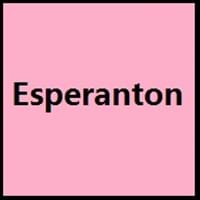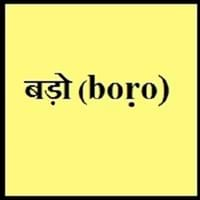Esperanto vs Bodo
Countries
East Asia, European Union, South America
Assam, India
National Language
East Asia, European Union
Assam, India
Second Language
Central Europe, East Asia, Eastern Europe, South America
Not Available
Speaking Continents
Asia, Europe, South America
Asia
Minority Language
Not spoken in any of the countries
Not Available
Regulated By
Akademio de Esperanto
Not Available
Interesting Facts
- The most widely spoken constructed language in the world is Esperanto.
- Esperanto is an artificial international language.
- In ancient times, Bodo language was written using Assamese script and Roman script.
- Bodo Language is written using Devanagari script since 1963.
Similar To
Not Available
Dimasa language, Garo language, Kokborok language
Derived From
Not Available
Not Available
Alphabets in
Esperanto-Alphabets.jpg#200
Bodo-Alphabets.jpg#200
Writing Direction
Not Available
Not Available
Language Levels
Not Available
Time Taken to Learn
Not Available
Thank You
Dankon
Not Available
How Are You?
Kiel vi sanas?
Nungni khabora ma?
Good Night
Bonan nokton
मोजां हर (Mwjang Hor)
Good Evening
Bonan vesperon
Not Available
Good Afternoon
Bonan posttagmezon
Not Available
Good Morning
Bonan matenon
मोजां फुं (Mwjang Fung)
Please
Mi petas
अननानै (Onnanwi)
Sorry
Mi bedaŭras!
Not Available
Bye
Ĝis poste
Not Available
I Love You
Mi amas vin
अननाइ नों (onnai Nwng)
Excuse Me
Pardonu!
Not Available
Dialect 1
Not present
(Sønabari) Western Boro dialect
Where They Speak
Not present
Bongaigaon, Kokrajhar
Dialect 2
Not present
(Sanzari) Eastern Boro dialect
Where They Speak
Not present
Barpeta, Darrang, Kamrup, Nalbari
Dialect 3
Not present
(Hazari) Southern Boro dialect
Where They Speak
Not present
Assam, India, Nepal
Speaking Population
Not Available
Not Available
Second Language Speakers
Not Available
Native Name
Esperanto
बड़ो (boṛo)
Alternative Names
Eo, La Lingvo Internacia
Bara, Bodi, Boro, Boroni, Kachari, Mech, Meche, Mechi, Meci
French Name
espéranto
Not Available
German Name
Esperanto
Not Available
Pronunciation
[espeˈranto]
[bɔɽo]
Ethnicity
Not Available
Bodo, Mech, (Assamese)
Language Family
Indo-European Family
Sino-Tibetan Family
Subgroup
Not Available
Tibeto-Burman
Branch
Not Available
Not Available
Early Forms
Proto-Esperanto
Not Available
Standard Forms
Esperanto
Not Available
Signed Forms
Signuno
Not Available
Scope
Individual
Individual
ISO 639 1
eo
Not Available
ISO 639 2/T
epo
Not Available
ISO 639 2/B
epo
Not Available
ISO 639 6
Not Available
Not Available
Glottocode
espe1235
bodo1269
Linguasphere
51-AAB-da
Not Available
Language Type
Constructed
Living
Language Linguistic Typology
Not Available
Not Available
Language Morphological Typology
Agglutinative
Not Available
Esperanto and Bodo Language History
Comparison of Esperanto vs Bodo language history gives us differences between origin of Esperanto and Bodo language. History of Esperanto language states that this language originated in 1887 whereas history of Bodo language states that this language originated in 1913. Family of the language also forms a part of history of that language. More on language families of these languages can be found out on Esperanto and Bodo Language History.
Esperanto and Bodo Greetings
People around the world use different languages to interact with each other. Even if we cannot communicate fluently in any language, it will always be beneficial to know about some of the common greetings or phrases from that language. This is where Esperanto and Bodo greetings helps you to understand basic phrases in Esperanto and Bodo language. Esperanto word for "Hello" is Halo or Bodo word for "Thank You" is Not Available. Find more of such common Esperanto Greetings and Bodo Greetings. These greetings will help you to be more confident when conversing with natives that speak these languages.
Esperanto vs Bodo Difficulty
The Esperanto vs Bodo difficulty level basically depends on the number of Esperanto Alphabets and Bodo Alphabets. Also the number of vowels and consonants in the language plays an important role in deciding the difficulty level of that language. The important points to be considered when we compare Esperanto and Bodo are the origin, speaking countries, language family, different greetings, speaking population of these languages. Want to know in Esperanto and Bodo, which language is harder to learn? Time required to learn Esperanto is 6 weeks while to learn Bodo time required is Not Available.





